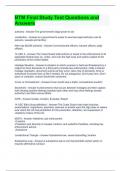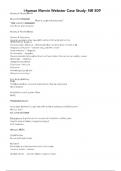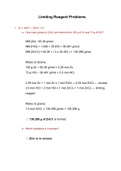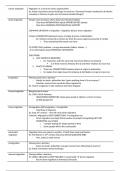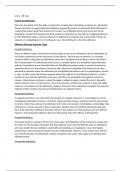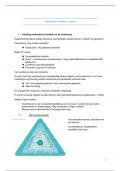authority - Answer-The government's legal power to act
Jurisdiction - Answer-Is a government's power to exercise legal authority over its persons, vessels and territory
Who has MLEM authority - Answer-Commissioned officers, warrant officers, petty officers.
14 USC 2 - Answer-The Coast Guard shall enforce or assist in the enforcement of all applicable federal laws on, under, and over the high seas and waters subject to the jurisdiction of the United States.
Hostage Situation - Answer-A situation in which a person is held and threatened by a subject to force demands on a third party normally law enforcement, notify a trained hostage negotiator, document events as they occur, take note of demands, force is authorized to prevent loss of life if needed. Do not antagonize, Don't play hero, Don't panic or complain, nurture Stockholm syndrome.
Cover vs Concealment - Answer-Cover would stop a bullet, concealment wouldn't
Stockholm - Answer-A phenomenon that occurs between hostages and their captors both develop positive feelings towards each other and may show feelings toward authority's and their rescue efforts
ICER - Answer-Isolate, Contain, Evaluate, Report
14 USC 89(a) (long definition) - Answer-The Coast Guard may make inquiries, examinations, inspections, searches, seizures or arrests upon the high seas or waters over which the US has jurisdiction for the prevention, detection, and suppresion of violations of laws of the US.
MCPA - Answer--Maritime Law enforcement
-Customs
-Protection and Security of vessels, harbors, and waterfront facilities, including law enforcement ashore
-Assistance
Jurisdictional Triangle - Answer-Substantive law, vessel status/flag, location
Substantive Law - Answer-A substantive law is one that prohibits certain action or requires affirmative conduct 4 Types of Nationality - Answer-United States, Foreign, Without Nationality, Assimilated without nationality
Define the Commandants Use of Force Policy - Answer-All of chapter 4 of the MLEM
4 types of subjects - Answer-Passive compliant
Passive resistor
Active resistor
Active aggressor
Passive compliant subject - Answer-Follows officers requests or verbal direction
Passive Resistor - Answer-A subject who does not follow the officer's requests or verbal
directions, but offers no physical resistance to the officer's attempts to gain control.
Active resistor - Answer-subject who does not follow the officer's requests or verbal directions, offers physical resistance that prevents or may prevent the officer from gaining control, but does not attempt to harm the officer
Active Aggressor Subject - Answer-A subject who attempts to harm or attack the officer
Define and explain level 1 - Answer-Officer presence is appearance, demeanor, and verbal and non-verbal communication that create an atmosphere of compliance.
UOF Policy - Answer-Only that force reasonably necessary under the circumstances may be used. Force shall not be used where assigned duties can be discharged without
it, excessive force may never be used; however, nothing in the application of the coast guard UOF policy shall be construed as to require personnel to meet force with equal or
lesser force
Define and explain level 2 - Answer-Verbal commands are in the form of task direction with consequences aimed at the subject
Define and explain level 3 - Answer-Control Techniques are techniques or actions with a low probability of causing connective tissue damage, lacerations of the skin, or broken
bones. These techniques include the proper use of restraint devices and pain compliance and strength techniques
Define and explain level 4 - Answer-Aggressive response techniques are techniques or actions that likely to result in connective tissue damage, lacerations of the skin, or broken bones or that will produce irritation of the skin, eyes, and or mucous membranes. These techniques include the proper use of kicks, stuns, punches, takedowns, and chemical irritants.

